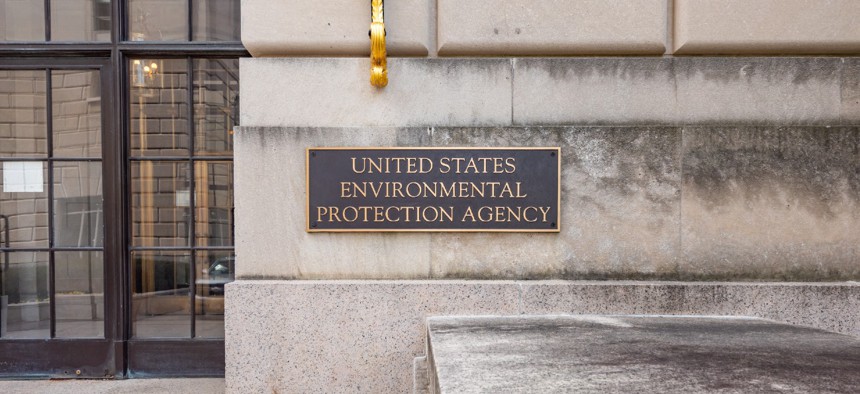
jimfeng / iStock.com
EPA Asked to Stop Barring Employees From Sharing Scientific Findings With Each Other
Agency says it supports open collaboration among employees, but some scientists have reported policies with the opposite effect.
A group is asking the Environmental Protection Agency to scrap a directive that prohibits some scientists from discussing their work amongst themselves, saying the current system prevents workers from properly protecting the public from potentially hazardous materials.
Managers at EPA began instituting the policy in early 2020, according to Public Employees for Environmental Responsibility, which wrote to the agency asking for its revocation. The ban affects the New Chemicals Division in EPA’s Office of Chemical Safety and Pollution Prevention, which conducts reviews of new materials before they are cleared for use in commercial products as required by the Toxic Substances Control Act.
The office is understaffed and lacking expertise, PEER said, increasing the need for scientists to be able to lean on each other and review their colleagues’ work. Where knowledge gaps or inexperience exist, consultation with others in the office can ensure sound assessments before new chemicals are approved. Tim Whitehouse, PEER’s executive director, said his organization represents EPA employees who have been reprimanded for “reaching out to other employees for feedback on their work.”
The policy “requires staff to needlessly duplicate work, which wastes staff time and taxpayer dollars,” Whitehouse said in a letter to Michal Freedhoff, EPA’s assistant administrator for chemical safety and pollution prevention. He added it fails to ensure that the employees’ work is “sufficiently protective of human health and the environment.” Making matters worse, he said, EPA has assigned the least experienced employees to the most complicated cases.
Jacob Carter, the senior scientist at the Union of Concerned Scientists, said such a policy would be very odd and difficult to justify. He called it “extremely important” for scientists to engage their colleagues about their work to review for potential red flags, mistakes or misinterpretation of data.
“It’s pretty standard scientific process,” Carter said.
Tim Carroll, an EPA spokesman, denied that EPA had any official policy within the chemical safety office that prohibited internal sharing of information.
“This administration is committed to ensuring that science is the backbone of everything we do as an agency,” Carroll said. “That includes a steadfast commitment to fostering a culture that promotes an open exchange and collaboration amongst all employees and includes coordinating with their management chain as appropriate so supervisors are aware of what staff are working on.”
Whitehouse pushed back on the denial, saying mid-level managers within the office created and are still enforcing a de facto policy.
“That is why we are calling on EPA to issue an affirmative policy statement allowing scientists within [the office] to consult with one another on hazards and risk assessments and to set clear public guidelines for when and how this consultation should occur,” Whitehouse said. “It has become clear that many mid-level managers are stovepiping scientists to limit scientific inquiry and help these managers rush new chemicals onto the market without an adequate review of their safety."
The complaints come just a month after employees in the chemical safety office blew the whistle on alleged interference by management to ensure the approval of certain substances. Employees said their reports were altered and they faced pressure to certify that some chemicals posed no risk to the public.
They also follow a push by the Biden administration to reverse policies instituted during the Trump administration that interfered with the work of career scientists across government. Biden signed an executive order shortly after taking office to improve agencies’ scientific integrity policies and expose any malfeasance that occurred in the previous administration.
“Improper political interference in the scientific process, with the work of scientists, and in the communication of scientific facts undermines the welfare of the nation, contributes to systemic inequities and injustices, and violates the public trust,” the White House said at the time.
While EPA under the Biden administration has vowed to empower scientists and new Administrator Michael Regan has pledged "open communication," EPA's Office of Pollution Prevention and Toxics sent a memorandum to employees earlier this year directing them not to speak directly to the press.
PEER called on EPA to both repeal the policy and punish the managers who enforced it.







